人教版高二英语必修5Unit 5 First aid Grammar课件(共44张PPT)
文档属性
| 名称 | 人教版高二英语必修5Unit 5 First aid Grammar课件(共44张PPT) | 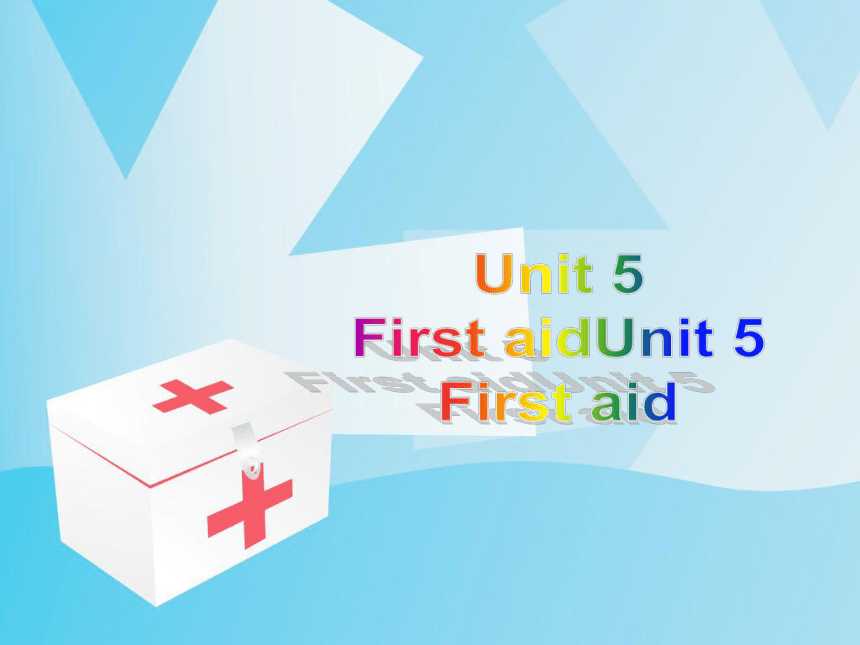 | |
| 格式 | zip | ||
| 文件大小 | 1.5MB | ||
| 资源类型 | 教案 | ||
| 版本资源 | 人教版(新课程标准) | ||
| 科目 | 英语 | ||
| 更新时间 | 2020-08-11 17:31:16 | ||
图片预览

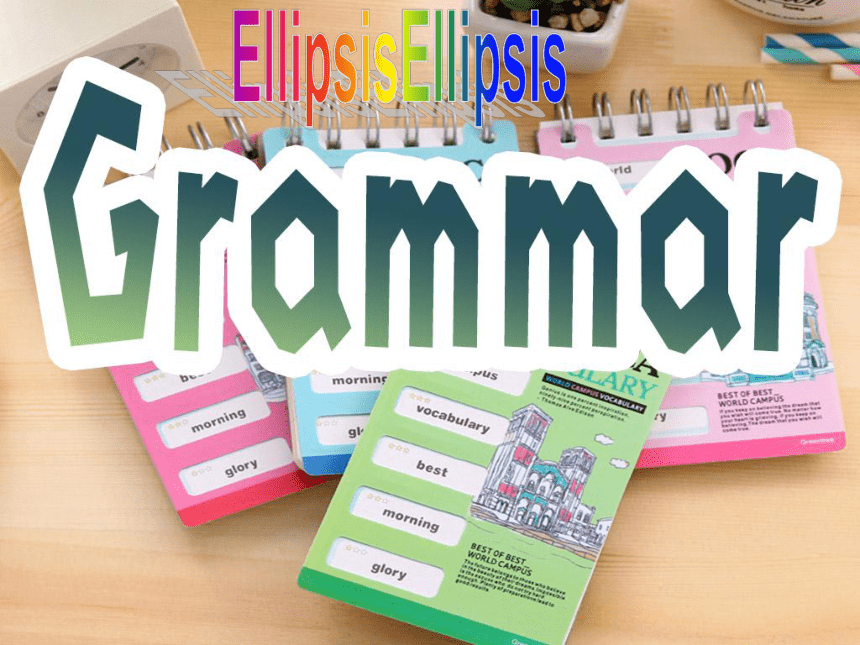
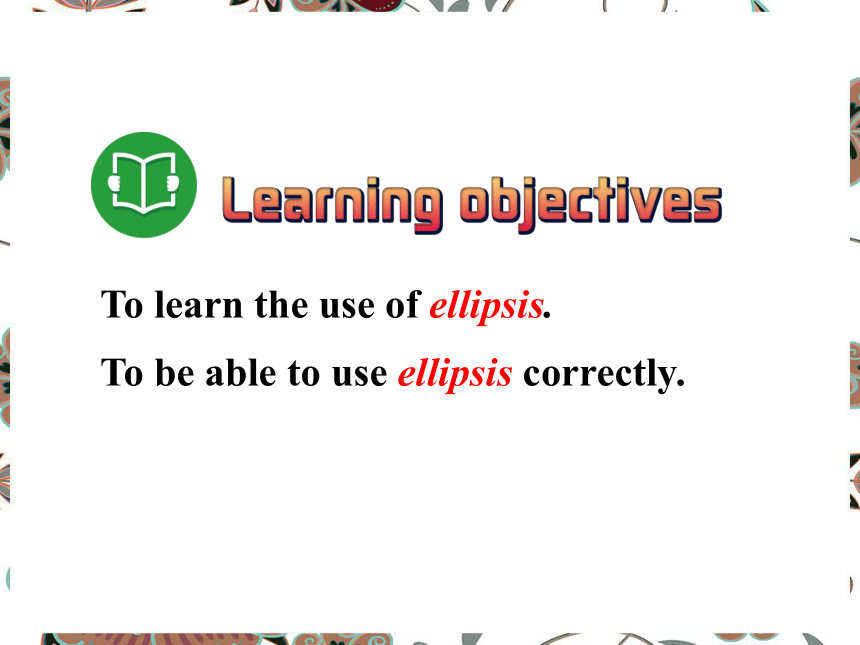


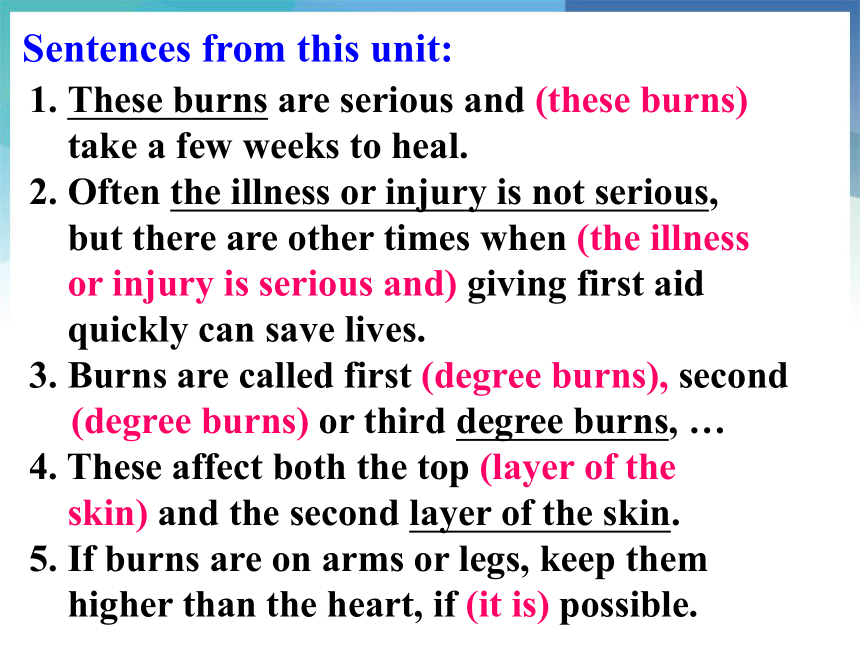
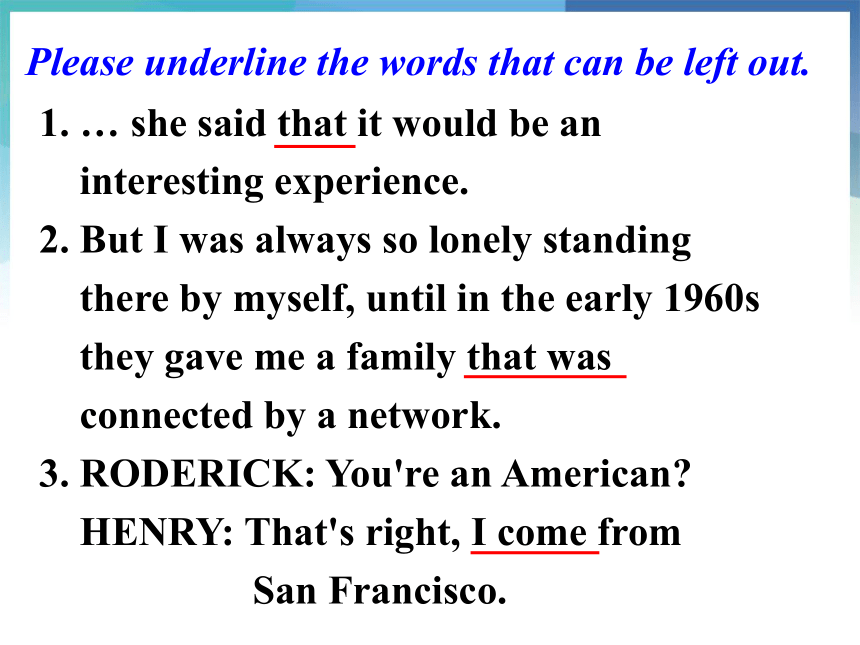

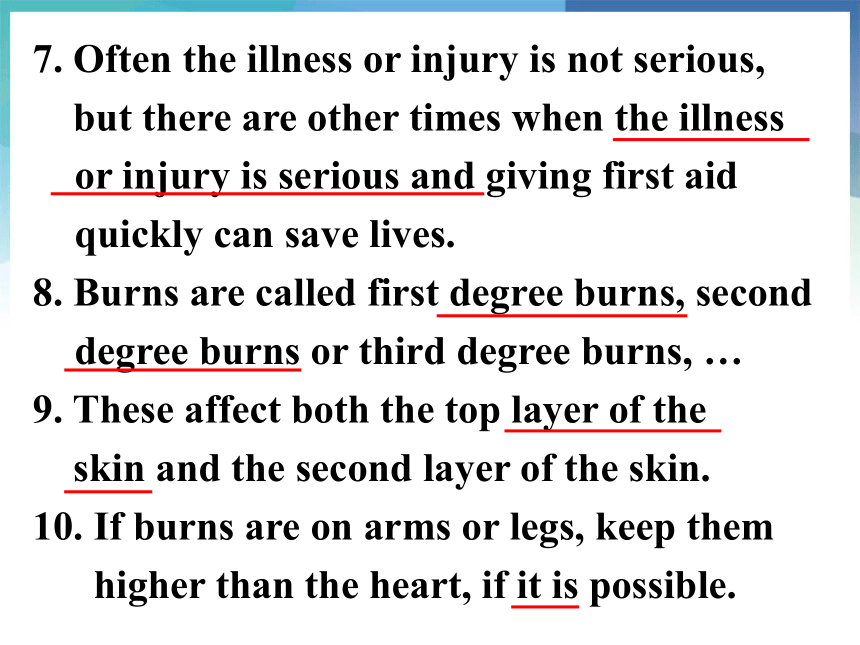
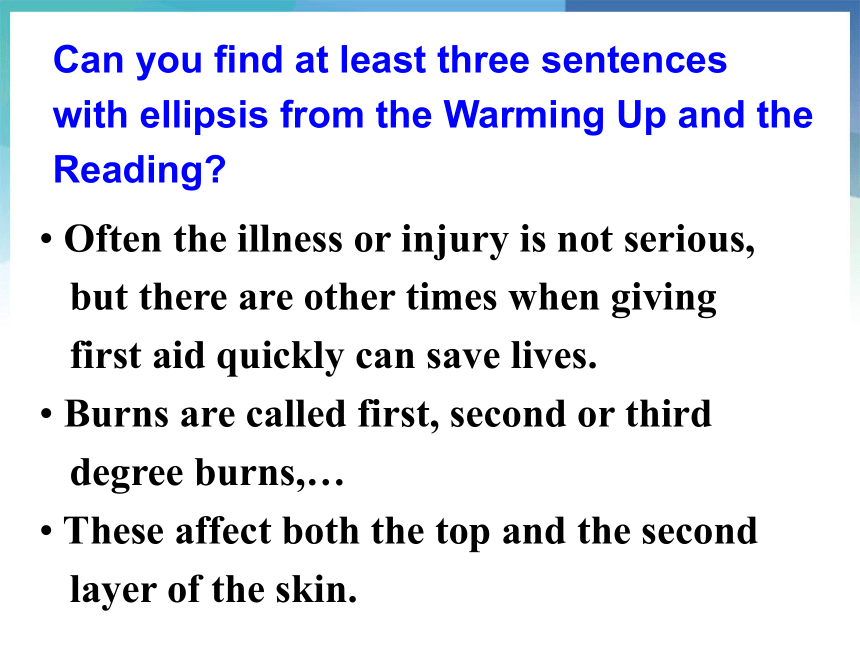
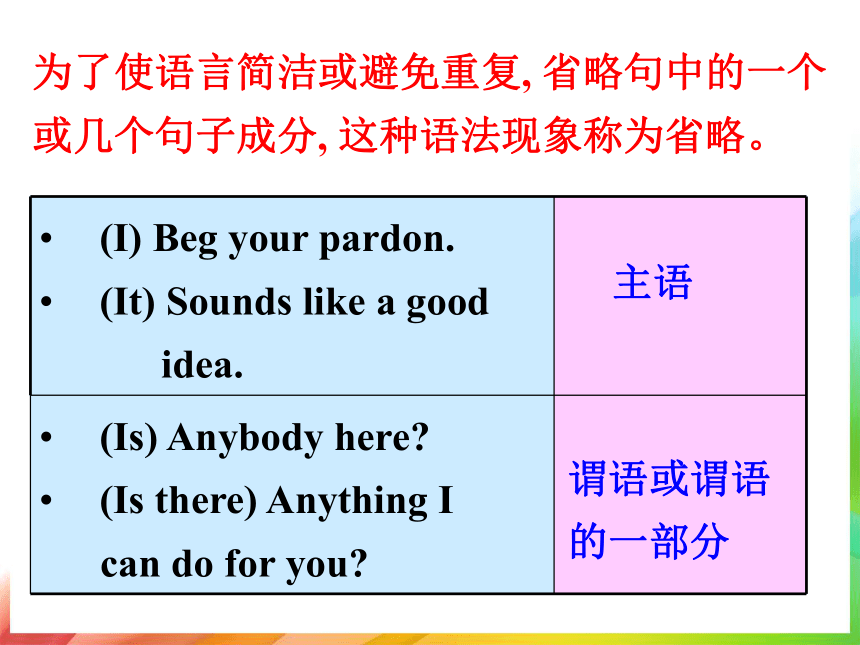
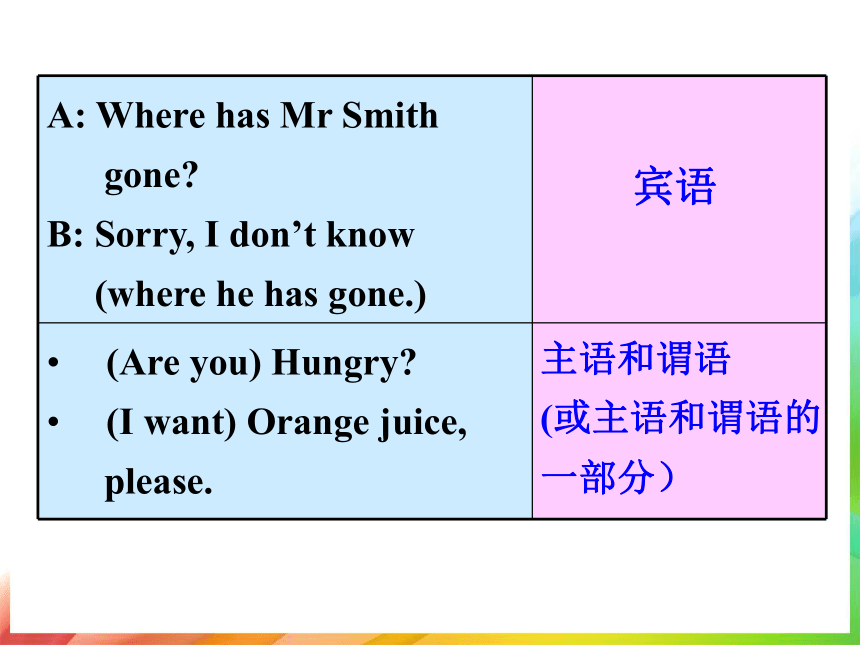
文档简介
(共44张PPT)
Unit
5
First
aid
Ellipsis
To
learn
the
use
of
ellipsis.
To
be
able
to
use
ellipsis
correctly.
Look
at
the
following
sentences.
1.
…
she
said
(that)
it
would
be
an
interesting
experience.
(必修1)
2.
But
I
was
always
so
lonely
standing
there
by
myself,
until
in
the
early
1960s
they
gave
me
a
family
(that
was)
connected
by
a
network.
(必修2)
3.
RODERICK:
You're
an
American?
HENRY:
That's
right,
(I
come)
from
San
Francisco.
(必修3)
4.
Jane
has
studied
these
families
of
chimps
for
many
years
and
(Jane
has)
helped
people
understand
how
much
they
behave
like
humans.
(必修4)
5.
(You
should)
wait
till
you're
more
experienced.
(必修5)
Sentences
from
this
unit:
1.
These
burns
are
serious
and
(these
burns)
take
a
few
weeks
to
heal.
2.
Often
the
illness
or
injury
is
not
serious,
but
there
are
other
times
when
(the
illness
or
injury
is
serious
and)
giving
first
aid
quickly
can
save
lives.
3.
Burns
are
called
first
(degree
burns),
second
(degree
burns)
or
third
degree
burns,
…
4.
These
affect
both
the
top
(layer
of
the
skin)
and
the
second
layer
of
the
skin.
5.
If
burns
are
on
arms
or
legs,
keep
them
higher
than
the
heart,
if
(it
is)
possible.
Please
underline
the
words
that
can
be
left
out.
1.
…
she
said
that
it
would
be
an
interesting
experience.
2.
But
I
was
always
so
lonely
standing
there
by
myself,
until
in
the
early
1960s
they
gave
me
a
family
that
was
connected
by
a
network.
3.
RODERICK:
You're
an
American?
HENRY:
That's
right,
I
come
from
San
Francisco.
4.
Jane
has
studied
these
families
of
chimps
for
many
years
and
Jane
has
helped
people
understand
how
much
they
behave
like
humans.
5.
You
should
wait
till
you're
more
experienced.
6.
These
burns
are
serious
and
these
burns
take
a
few
weeks
to
heal.
7.
Often
the
illness
or
injury
is
not
serious,
but
there
are
other
times
when
the
illness
or
injury
is
serious
and
giving
first
aid
quickly
can
save
lives.
8.
Burns
are
called
first
degree
burns,
second
degree
burns
or
third
degree
burns,
…
9.
These
affect
both
the
top
layer
of
the
skin
and
the
second
layer
of
the
skin.
10.
If
burns
are
on
arms
or
legs,
keep
them
higher
than
the
heart,
if
it
is
possible.
Can
you
find
at
least
three
sentences
with
ellipsis
from
the
Warming
Up
and
the
Reading?
Often
the
illness
or
injury
is
not
serious,
but
there
are
other
times
when
giving
first
aid
quickly
can
save
lives.
Burns
are
called
first,
second
or
third
degree
burns,…
These
affect
both
the
top
and
the
second
layer
of
the
skin.
为了使语言简洁或避免重复,
省略句中的一个或几个句子成分,
这种语法现象称为省略。
主语
谓语或谓语的一部分
(I)
Beg
your
pardon.
(It)
Sounds
like
a
good
idea.
(Is)
Anybody
here?
(Is
there)
Anything
I
can
do
for
you?
宾语
主语和谓语
(或主语和谓语的一部分)
A:
Where
has
Mr
Smith
gone?
B:
Sorry,
I
don’t
know
(where
he
has
gone.)
(Are
you)
Hungry?
(I
want)
Orange
juice,
please.
不定式后省略动词
A:
Would
you
like
to
come
to
the
party?
B:
I’d
love
to
(come
the
party).
They
do
not
visit
their
parents
as
much
as
they
ought
to
(visit
their
parents).
Now
it’s
your
turn
to
find
out
what
have
been
left
out.
1.
Haven’t
seen
you
for
ages.
?2.
Some
more
tea?
3.
Sounds
like
a
good
idea.
I
haven’t
seen
you
for
ages.
Would
you
like
some
more
tea?
That
/
It
sounds
like
a
good
idea.
省略一些不言自明的成分
4.
Don’t
make
too
much
noise.
5.
Sorry
to
hear
that.
You
don’t
make
too
much
noise.
I’m
sorry
to
hear
that.
6.
Pity
you
couldn’t
come.
7.
This
way,
please.
It’s/
What
a
pity
you
couldn’t
come.
Step
this
way,
please.
祈使句中,通常省略主语you,
有时还可省略句首动词
8.
Terrible
weather!
9.
Joining
us
for
a
drink?
10.
Going
to
the
supermarket?
What
terrible
weather
it
is!
Are
you
joining
us
for
a
drink?
?
Are
you
going
to
the
supermarket?
在提出问题时,往往可以省略句子的起首部分
感叹句中,有时可省略后面的主语和系动词
阅读句子,归纳其中省略的用法。
1.
a.
(You)
Have
a
pleasant
journey.
b.
(Has)
Everybody
gone?
c.
—(You)
Show
me
your
essay
please.
—I’ll
show
you
(my
essay)
later.
d.
(He
is)
A
nice
man,
isn’t
he?
e.
—George
isn’t
coming.
—Why
(isn’t
he
coming)?
简单句中,可省略主语、谓语或谓语的一部分、宾语等,甚至同时省略若干成分。
2.
a.
I
work
in
a
factory
and
my
sister
(works)
on
a
farm.
b.
She
can’t
speak
French
and
I
can't
(speak
French)
either.
并列句中,如果后面的分句与前面的分句中有相同的成分,则该成分常被省略,以避免重复。
3.
a.
The
letter
(that
/
which)
I
received
from
him
yesterday
is
very
important.
b.
The
man
(that
/
who
/
whom)
I
saw
just
now
is
called
Smith.
定语从句中的省略
限制性定语从句中,可省略在从句中作
______的关系代词that,
which,
whom,
who。
宾语
4.
a.
When
(he
was)
rescued,
he
was
almost
dead.
b.
If
(you
are)
in
doubt,
you
can
ask
at
your
local
library.
c.
Although
(he
is)
still
young,
he
is
going
very
grey.
d.
Ring
me
at
home
if
(it
is)
necessary.
状语从句中的省略
状语从句中,如从句的主语与主句的主语一致,谓语中又包含动词be时,可以省略主语和动词be;状语从句中作主语的代词it以及动词be也可以省略。
5.
a.
I
don’t
believe
(that)
he
ever
said
such
a
thing.??
b.
The
passengers
were
told
(that)
their
plane
was
about
to
take
off
and
that
they
should
fasten
their
seatbelts.
宾语从句中的省略
宾语从句中,连词that一般可以省略;但宾语从句中包含that引导的两个或两个以上的并列的宾语从句时,通常只有第____个that可以省略。
一
3.
Rewrite
these
sentences
by
taking
out
the
unnecessary
parts.
1)
The
burn
that
she
got
from
the
iron
was
red
and
it
was
very
painful.
(____)
(___)
2.
A
boy
was
on
the
left
side
of
the
sick
woman,
and
a
girl
was
on
the
right
side
of
the
sick
woman.
3.
She
has
a
daughter
who
is
in
hospital.
4.
He
went
to
the
doctor
because
he
had
to
go
to
the
doctor
.
(___________________)
(_____)
(_____________)
5.
Did
she
pass
the
first
aid
test
that
she
did
yesterday
or
didn’t
she
pass?
or
not?
6.
She
could
not
decided
whether
to
send
him
to
hospital
or
not
to
send
him
to
hospital.
7.
When
your
nose
is
bleeding,
you
should
bend
forward
so
that
the
blood
runs
out
of
your
nose
and
the
blood
doesn’t
run
down
your
throat.
8.
Only
some
of
the
students
have
done
a
first
aid
course
but
most
of
the
students
haven’t
done
a
first
aid
course
.
not
down
your
throat.
These
sentences
are
correct.
However,
one
or
more
words
have
been
left
out.
Can
you
tell
your
partner
which
words
are
missing?
1)?The
temple
surrounded
by
a
wall
belongs
to
the
local
government.
The
temple
(which
is)
surrounded
by
a
wall
belongs
to
the
local
government.
4.
2)?The
first
book
I
read
this
term
was
more
interesting
than
the
second.
The
first
book
(that)
I
read
this
term
was
more
interesting
than
the
second
(book
that
I
read
this
term).
定语从句中的省略
3)
To
her
teacher’s
surprise,
she
did
better
in
her
first
aid
exam
than
expected.
??
To
her
teacher’s
surprise,
she
did
better
in
her
first
aid
exam
than
(she
was)
expected
(to
do).
在
than,
as
引导的比较状语从句中的省略
4)
I
don’t
think
they
have
returned
from
the
hospital,
but
they
might
have.
I
don’t
think
they
have
returned
from
the
hospital,
but
they
might
have
(returned
from
the
hospital).
在并列复合句中,后面分句中与前面分句中相同的部分常可省略
5)
He
wanted
to
help
the
accident
victim
but
his
friend
didn’t.
He
wanted
to
help
the
accident
victim
but
his
friend
didn’t
(want
to
help
the
accident
victim).
在并列复合句中,后面分句中与前面分句中相同的部分常可省略
6)
You
can
borrow
my
first
aid
notes
if
you
want
to.
You
can
borrow
my
first
aid
notes
if
you
want
to
(borrow
my
first
aid
notes).
不定式后省略动词
7)
Sounds
like
a
good
idea.
(It)
sounds
like
a
good
idea.
8)
Anything
I
can
do
for
you?
(Is
there)
anything
I
can
do
for
you?
【注意】
①
当先行词为the
way时,从句可用that或in
which引导,that或in
which也常被省略。如:
I
love
to
watch
the
way
(that
/
in
which)
she
plays
with
the
children.
②
关系代词作介词的宾语,且介词置于关系代词之前时,关系代词不可省略。如:
The
friend
with
whom
I
was
traveling
spoke
Spanish.
③
有时可用so或not代替上文的内容,这并不构成省略,但也起到省略的作用。如:
—Will
we
get
paid
this
week???????
—I
certainly
hope
so!
(I
certainly
hope
we
will
get
paid
this
week!)
I
think
I
can
fix
it
tomorrow.
If
not
(If
I
can’t
fix
it
tomorrow),
you’ll
have
to
wait
till
Friday.
【拓展】
动词不定式中为了避免重复,常省去前文出现过的相同部分,只保留不定式符号to;但如果不定式结构中含有be,
have,
have
been时,这些词也要保留。如:
You
can
drive
today
if
you
want
to
(drive).
—Are
you
a
teacher
now?
—No,
but
I
used
to
be
(a
teacher).
1.
省略的概念:为了使语言简洁或避免重复,省略句中的一个或几个句子成分。
2.
可省略的成分。
3.
用省略的情况。
在不违反语法结构规则以及不产生歧义的前提下,恰当运用省略,具有多方面效果。如:简略旧信息,突显新信息;避免罗嗦,衔接连贯;蕴涵想象空间,增强语言美感;在各种语体中,表现不同的言语风格。
语言中存在大量的省略现象。当不想重复意思很明确的单词或短语时,可使用省略形式。
使用省略是使句子变得简练的方法。并列句、短语以及主从句中都有运用省略的情况。虽省去了句子语法构造所需要的一种或多种组成部分,但仍能够清晰表达含义。
I.?标出下面句子中可以省略的部分。
1.
—What
Kate
said
did
really
hurt
John.
—I’m
sure
she
didn’t
mean
to
hurt
him.
2.
One
side
of
the
wall
should
be
painted
yellow,
and
the
other
side
of
it
should
be
painted
white.
3.
The
disease
can
result
in
total
blindness
if
it
is
left
untreated.
4.
Ask
him
to
take
you
home
if
it
is
possible.
5.
The
girl
is
very
shy,
and
she
never
speaks
until
she
is
spoken
to.
6.
—When
is
he
leaving?
—He
is
leaving
tonight.
7.
The
boy
wanted
to
ride
his
bicycle
in
the
street,
but
his
mother
told
him
not
to
do
it.
8.
He
came
home
earlier
than
he
was
expected.
II.?将下面句子改写为省略句。
George
will
take
the
course
and
Mike
might
take
the
course
too.
2.
He
was
the
greatest
footballer
ever,
and
remains
the
greatest
footballer
ever.
George
will
take
the
course
and
Mike
might
too.
He
was,
and
remains,
the
greatest
footballer
ever.
3.
While
I
was
in
Hangzhou,
I
paid
a
visit
to
the
West
Lake.
4.
The
author
whom
you
criticized
in
your
review
has
written
a
letter
in
reply.
While
in
Hangzhou,
I
paid
a
visit
to
the
West
Lake.
The
author
you
criticized
in
your
review
has
written
a
letter
in
reply.
5.
He’ll
come
soon
but
I
don’t
know
exactly
when
he’ll
come.
6.
I’d
certainly
like
to
go
back
to
Australia.
I
hope
to
go
back
to
Australia
next
year.
He’ll
come
soon
but
I
don’t
know
exactly
when.
I’d
certainly
like
to
go
back
to
Australia.
I
hope
to
next
year.
1.
Go
over
the
usage
of
Ellipsis.
2.
Finish
Using
structures
on
Page
71
Ex
1
,
Ex
2
and
Ex3.
Unit
5
First
aid
Ellipsis
To
learn
the
use
of
ellipsis.
To
be
able
to
use
ellipsis
correctly.
Look
at
the
following
sentences.
1.
…
she
said
(that)
it
would
be
an
interesting
experience.
(必修1)
2.
But
I
was
always
so
lonely
standing
there
by
myself,
until
in
the
early
1960s
they
gave
me
a
family
(that
was)
connected
by
a
network.
(必修2)
3.
RODERICK:
You're
an
American?
HENRY:
That's
right,
(I
come)
from
San
Francisco.
(必修3)
4.
Jane
has
studied
these
families
of
chimps
for
many
years
and
(Jane
has)
helped
people
understand
how
much
they
behave
like
humans.
(必修4)
5.
(You
should)
wait
till
you're
more
experienced.
(必修5)
Sentences
from
this
unit:
1.
These
burns
are
serious
and
(these
burns)
take
a
few
weeks
to
heal.
2.
Often
the
illness
or
injury
is
not
serious,
but
there
are
other
times
when
(the
illness
or
injury
is
serious
and)
giving
first
aid
quickly
can
save
lives.
3.
Burns
are
called
first
(degree
burns),
second
(degree
burns)
or
third
degree
burns,
…
4.
These
affect
both
the
top
(layer
of
the
skin)
and
the
second
layer
of
the
skin.
5.
If
burns
are
on
arms
or
legs,
keep
them
higher
than
the
heart,
if
(it
is)
possible.
Please
underline
the
words
that
can
be
left
out.
1.
…
she
said
that
it
would
be
an
interesting
experience.
2.
But
I
was
always
so
lonely
standing
there
by
myself,
until
in
the
early
1960s
they
gave
me
a
family
that
was
connected
by
a
network.
3.
RODERICK:
You're
an
American?
HENRY:
That's
right,
I
come
from
San
Francisco.
4.
Jane
has
studied
these
families
of
chimps
for
many
years
and
Jane
has
helped
people
understand
how
much
they
behave
like
humans.
5.
You
should
wait
till
you're
more
experienced.
6.
These
burns
are
serious
and
these
burns
take
a
few
weeks
to
heal.
7.
Often
the
illness
or
injury
is
not
serious,
but
there
are
other
times
when
the
illness
or
injury
is
serious
and
giving
first
aid
quickly
can
save
lives.
8.
Burns
are
called
first
degree
burns,
second
degree
burns
or
third
degree
burns,
…
9.
These
affect
both
the
top
layer
of
the
skin
and
the
second
layer
of
the
skin.
10.
If
burns
are
on
arms
or
legs,
keep
them
higher
than
the
heart,
if
it
is
possible.
Can
you
find
at
least
three
sentences
with
ellipsis
from
the
Warming
Up
and
the
Reading?
Often
the
illness
or
injury
is
not
serious,
but
there
are
other
times
when
giving
first
aid
quickly
can
save
lives.
Burns
are
called
first,
second
or
third
degree
burns,…
These
affect
both
the
top
and
the
second
layer
of
the
skin.
为了使语言简洁或避免重复,
省略句中的一个或几个句子成分,
这种语法现象称为省略。
主语
谓语或谓语的一部分
(I)
Beg
your
pardon.
(It)
Sounds
like
a
good
idea.
(Is)
Anybody
here?
(Is
there)
Anything
I
can
do
for
you?
宾语
主语和谓语
(或主语和谓语的一部分)
A:
Where
has
Mr
Smith
gone?
B:
Sorry,
I
don’t
know
(where
he
has
gone.)
(Are
you)
Hungry?
(I
want)
Orange
juice,
please.
不定式后省略动词
A:
Would
you
like
to
come
to
the
party?
B:
I’d
love
to
(come
the
party).
They
do
not
visit
their
parents
as
much
as
they
ought
to
(visit
their
parents).
Now
it’s
your
turn
to
find
out
what
have
been
left
out.
1.
Haven’t
seen
you
for
ages.
?2.
Some
more
tea?
3.
Sounds
like
a
good
idea.
I
haven’t
seen
you
for
ages.
Would
you
like
some
more
tea?
That
/
It
sounds
like
a
good
idea.
省略一些不言自明的成分
4.
Don’t
make
too
much
noise.
5.
Sorry
to
hear
that.
You
don’t
make
too
much
noise.
I’m
sorry
to
hear
that.
6.
Pity
you
couldn’t
come.
7.
This
way,
please.
It’s/
What
a
pity
you
couldn’t
come.
Step
this
way,
please.
祈使句中,通常省略主语you,
有时还可省略句首动词
8.
Terrible
weather!
9.
Joining
us
for
a
drink?
10.
Going
to
the
supermarket?
What
terrible
weather
it
is!
Are
you
joining
us
for
a
drink?
?
Are
you
going
to
the
supermarket?
在提出问题时,往往可以省略句子的起首部分
感叹句中,有时可省略后面的主语和系动词
阅读句子,归纳其中省略的用法。
1.
a.
(You)
Have
a
pleasant
journey.
b.
(Has)
Everybody
gone?
c.
—(You)
Show
me
your
essay
please.
—I’ll
show
you
(my
essay)
later.
d.
(He
is)
A
nice
man,
isn’t
he?
e.
—George
isn’t
coming.
—Why
(isn’t
he
coming)?
简单句中,可省略主语、谓语或谓语的一部分、宾语等,甚至同时省略若干成分。
2.
a.
I
work
in
a
factory
and
my
sister
(works)
on
a
farm.
b.
She
can’t
speak
French
and
I
can't
(speak
French)
either.
并列句中,如果后面的分句与前面的分句中有相同的成分,则该成分常被省略,以避免重复。
3.
a.
The
letter
(that
/
which)
I
received
from
him
yesterday
is
very
important.
b.
The
man
(that
/
who
/
whom)
I
saw
just
now
is
called
Smith.
定语从句中的省略
限制性定语从句中,可省略在从句中作
______的关系代词that,
which,
whom,
who。
宾语
4.
a.
When
(he
was)
rescued,
he
was
almost
dead.
b.
If
(you
are)
in
doubt,
you
can
ask
at
your
local
library.
c.
Although
(he
is)
still
young,
he
is
going
very
grey.
d.
Ring
me
at
home
if
(it
is)
necessary.
状语从句中的省略
状语从句中,如从句的主语与主句的主语一致,谓语中又包含动词be时,可以省略主语和动词be;状语从句中作主语的代词it以及动词be也可以省略。
5.
a.
I
don’t
believe
(that)
he
ever
said
such
a
thing.??
b.
The
passengers
were
told
(that)
their
plane
was
about
to
take
off
and
that
they
should
fasten
their
seatbelts.
宾语从句中的省略
宾语从句中,连词that一般可以省略;但宾语从句中包含that引导的两个或两个以上的并列的宾语从句时,通常只有第____个that可以省略。
一
3.
Rewrite
these
sentences
by
taking
out
the
unnecessary
parts.
1)
The
burn
that
she
got
from
the
iron
was
red
and
it
was
very
painful.
(____)
(___)
2.
A
boy
was
on
the
left
side
of
the
sick
woman,
and
a
girl
was
on
the
right
side
of
the
sick
woman.
3.
She
has
a
daughter
who
is
in
hospital.
4.
He
went
to
the
doctor
because
he
had
to
go
to
the
doctor
.
(___________________)
(_____)
(_____________)
5.
Did
she
pass
the
first
aid
test
that
she
did
yesterday
or
didn’t
she
pass?
or
not?
6.
She
could
not
decided
whether
to
send
him
to
hospital
or
not
to
send
him
to
hospital.
7.
When
your
nose
is
bleeding,
you
should
bend
forward
so
that
the
blood
runs
out
of
your
nose
and
the
blood
doesn’t
run
down
your
throat.
8.
Only
some
of
the
students
have
done
a
first
aid
course
but
most
of
the
students
haven’t
done
a
first
aid
course
.
not
down
your
throat.
These
sentences
are
correct.
However,
one
or
more
words
have
been
left
out.
Can
you
tell
your
partner
which
words
are
missing?
1)?The
temple
surrounded
by
a
wall
belongs
to
the
local
government.
The
temple
(which
is)
surrounded
by
a
wall
belongs
to
the
local
government.
4.
2)?The
first
book
I
read
this
term
was
more
interesting
than
the
second.
The
first
book
(that)
I
read
this
term
was
more
interesting
than
the
second
(book
that
I
read
this
term).
定语从句中的省略
3)
To
her
teacher’s
surprise,
she
did
better
in
her
first
aid
exam
than
expected.
??
To
her
teacher’s
surprise,
she
did
better
in
her
first
aid
exam
than
(she
was)
expected
(to
do).
在
than,
as
引导的比较状语从句中的省略
4)
I
don’t
think
they
have
returned
from
the
hospital,
but
they
might
have.
I
don’t
think
they
have
returned
from
the
hospital,
but
they
might
have
(returned
from
the
hospital).
在并列复合句中,后面分句中与前面分句中相同的部分常可省略
5)
He
wanted
to
help
the
accident
victim
but
his
friend
didn’t.
He
wanted
to
help
the
accident
victim
but
his
friend
didn’t
(want
to
help
the
accident
victim).
在并列复合句中,后面分句中与前面分句中相同的部分常可省略
6)
You
can
borrow
my
first
aid
notes
if
you
want
to.
You
can
borrow
my
first
aid
notes
if
you
want
to
(borrow
my
first
aid
notes).
不定式后省略动词
7)
Sounds
like
a
good
idea.
(It)
sounds
like
a
good
idea.
8)
Anything
I
can
do
for
you?
(Is
there)
anything
I
can
do
for
you?
【注意】
①
当先行词为the
way时,从句可用that或in
which引导,that或in
which也常被省略。如:
I
love
to
watch
the
way
(that
/
in
which)
she
plays
with
the
children.
②
关系代词作介词的宾语,且介词置于关系代词之前时,关系代词不可省略。如:
The
friend
with
whom
I
was
traveling
spoke
Spanish.
③
有时可用so或not代替上文的内容,这并不构成省略,但也起到省略的作用。如:
—Will
we
get
paid
this
week???????
—I
certainly
hope
so!
(I
certainly
hope
we
will
get
paid
this
week!)
I
think
I
can
fix
it
tomorrow.
If
not
(If
I
can’t
fix
it
tomorrow),
you’ll
have
to
wait
till
Friday.
【拓展】
动词不定式中为了避免重复,常省去前文出现过的相同部分,只保留不定式符号to;但如果不定式结构中含有be,
have,
have
been时,这些词也要保留。如:
You
can
drive
today
if
you
want
to
(drive).
—Are
you
a
teacher
now?
—No,
but
I
used
to
be
(a
teacher).
1.
省略的概念:为了使语言简洁或避免重复,省略句中的一个或几个句子成分。
2.
可省略的成分。
3.
用省略的情况。
在不违反语法结构规则以及不产生歧义的前提下,恰当运用省略,具有多方面效果。如:简略旧信息,突显新信息;避免罗嗦,衔接连贯;蕴涵想象空间,增强语言美感;在各种语体中,表现不同的言语风格。
语言中存在大量的省略现象。当不想重复意思很明确的单词或短语时,可使用省略形式。
使用省略是使句子变得简练的方法。并列句、短语以及主从句中都有运用省略的情况。虽省去了句子语法构造所需要的一种或多种组成部分,但仍能够清晰表达含义。
I.?标出下面句子中可以省略的部分。
1.
—What
Kate
said
did
really
hurt
John.
—I’m
sure
she
didn’t
mean
to
hurt
him.
2.
One
side
of
the
wall
should
be
painted
yellow,
and
the
other
side
of
it
should
be
painted
white.
3.
The
disease
can
result
in
total
blindness
if
it
is
left
untreated.
4.
Ask
him
to
take
you
home
if
it
is
possible.
5.
The
girl
is
very
shy,
and
she
never
speaks
until
she
is
spoken
to.
6.
—When
is
he
leaving?
—He
is
leaving
tonight.
7.
The
boy
wanted
to
ride
his
bicycle
in
the
street,
but
his
mother
told
him
not
to
do
it.
8.
He
came
home
earlier
than
he
was
expected.
II.?将下面句子改写为省略句。
George
will
take
the
course
and
Mike
might
take
the
course
too.
2.
He
was
the
greatest
footballer
ever,
and
remains
the
greatest
footballer
ever.
George
will
take
the
course
and
Mike
might
too.
He
was,
and
remains,
the
greatest
footballer
ever.
3.
While
I
was
in
Hangzhou,
I
paid
a
visit
to
the
West
Lake.
4.
The
author
whom
you
criticized
in
your
review
has
written
a
letter
in
reply.
While
in
Hangzhou,
I
paid
a
visit
to
the
West
Lake.
The
author
you
criticized
in
your
review
has
written
a
letter
in
reply.
5.
He’ll
come
soon
but
I
don’t
know
exactly
when
he’ll
come.
6.
I’d
certainly
like
to
go
back
to
Australia.
I
hope
to
go
back
to
Australia
next
year.
He’ll
come
soon
but
I
don’t
know
exactly
when.
I’d
certainly
like
to
go
back
to
Australia.
I
hope
to
next
year.
1.
Go
over
the
usage
of
Ellipsis.
2.
Finish
Using
structures
on
Page
71
Ex
1
,
Ex
2
and
Ex3.
